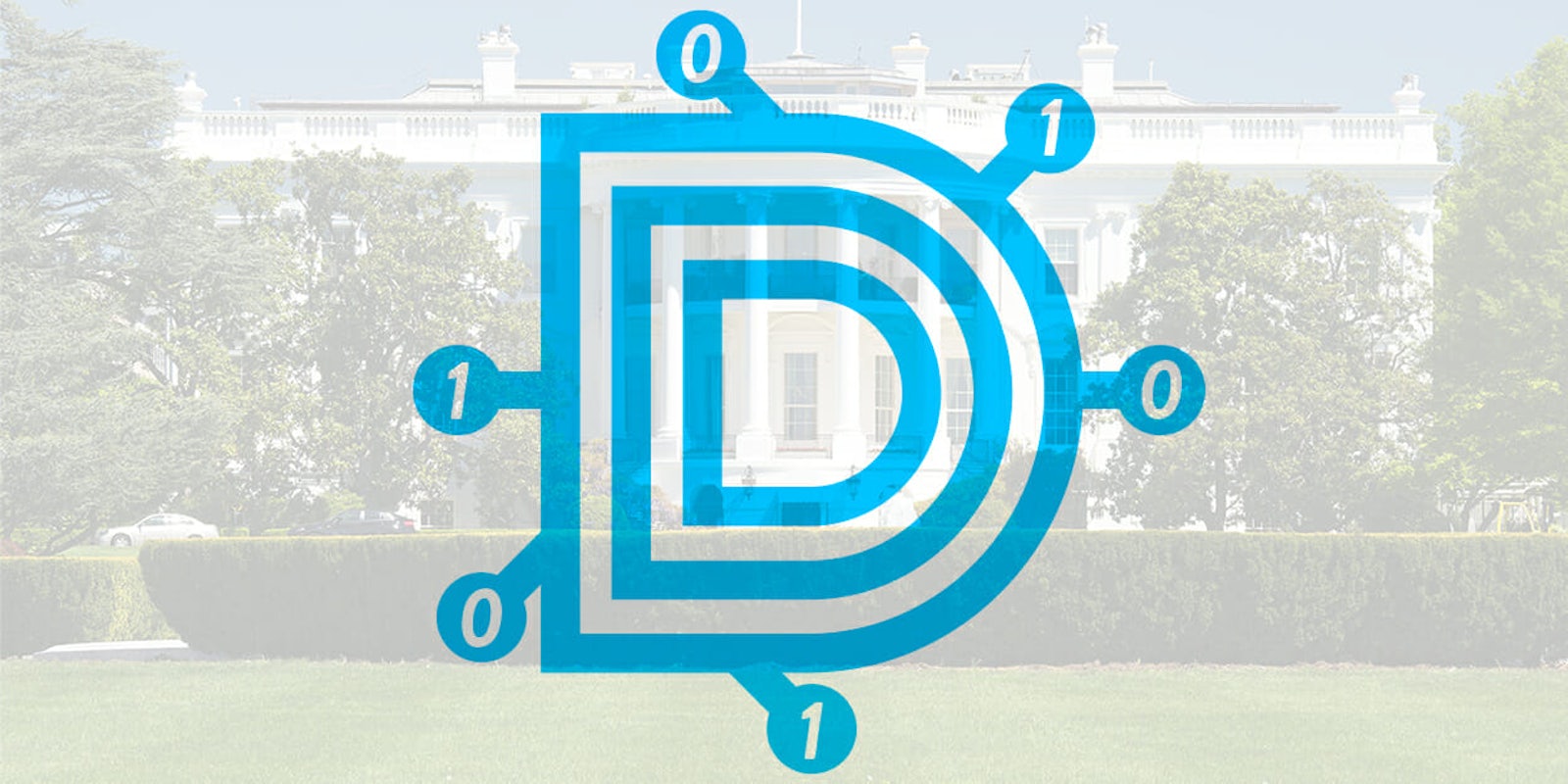Democrats in Congress have discussed net neutrality consistently for more than a year—but will the issue reach the level of presidential politics as the party decides who will square off against President Donald Trump in the 2020 election?
Since the repeal of the rules by the Federal Communications Commission (FCC) in 2017, there have been numerous Democrat-led attempts to reverse the decision. Last year, both chambers of Congress attempted to use the Congressional Review Act (CRA) to overturn the repeal, and while they did get bipartisan support in the Senate, lawmakers were unable to wrangle the necessary votes in the House.
More recently, there have been Republican calls for net neutrality legislation. But the current iterations of bills do not include classifying internet service providers (ISPs) under Title II of the Communications Act, which many Democrats and pro-net neutrality advocates have called the only real acceptable solution.
Despite the Title II divisions currently in Congress, there is a large contingent of lawmakers who generally support the issue. But presidential elections can also impact net neutrality, maybe more so than Congress. It was former President Barack Obama’s FCC who spearheaded the 2015 Open Internet Order and Trump’s FCC Chairman Ajit Pai was instrumental in developing a way to reverse that order.
However, there may be a concrete proposal for 2020 Democrats to support. On Wednesday, Democratic lawmakers are expected to unveil the “Save The Internet Act.” While text of the legislation has not been released as of today, it’s expected to include Title II classification.
Nearly all of the announced 2020 Democrats, whether they are actively running or in an exploratory phase, have publicly expressed support for net neutrality in the past, echoing the slew of new Democrats who were elected during the 2018 midterm elections.
With so much public support for net neutrality, experts say Democrats vying for the party’s ticket in 2020 shouldn’t shy away from making it a focal point in their campaigns.
“Given the consistently high polling numbers across party lines in support of strong open internet policies, and the massive levels of activist energy behind this issue, Democratic candidates only stand to benefit by highlighting their support for net neutrality,” Mark Stanley, the director of communications for Demand Progress, told the Daily Dot. “Any opposition to net neutrality would be both conspicuous and a major mark against Democratic candidates in the eyes of voters whose support they’ll need in order to win.”
The Daily Dot reached out to all of the 2020 Democrats (as of February 28) about their stance on net neutrality, but only former Rep. John Delaney’s office returned a request for comment.
“I strongly opposed the most recent FCC decision to repeal net neutrality rules as I believe broadband should continue to be regulated by the FCC under Title II,” Delaney said in a statement to the Daily Dot, adding: “Most importantly, net neutrality rules protect equality of access and opportunity so that there is not a digital divide between our nation’s wealthy and poor students or between rural and urban America. In Congress, I co-sponsored the Save Net Neutrality Act and as President will fight for an open and equal internet and make reinstatement of these rules a priority of my Administration.”
However, many of the 2020 contenders have shown support for net neutrality in the past Sen. Amy Klobuchar (D-Minn.) even brought up the issue during the speech that launched her presidential campaign, calling for a “guarantee” for net neutrality.
Some voters told the Daily Dot ahead of the 2018 midterms that net neutrality would be a major issue for them as they headed to the ballot box. So here’s a look at how the 2020 Democrats view net neutrality:
2020 Democrats On Net Neutrality
1) Bernie Sanders 2020 Net Neutrality
Sen. Bernie Sanders (I-Vt.) has been an outspoken proponent of net neutrality for years, and in March 2016 said that any repeal of the rules would be a “disaster for our country, for our small businesses and for the free flow of ideas.”
His support for the issue stretches back to before the 2015 Open Internet Order was passed by the FCC, with Sanders linking to a form on his website for people to ask the FCC to pass net neutrality rules in May 2014. The order was passed in February 2015.
Around the same time in 2014, Sanders gave a speech on the Senate floor in support of net neutrality where he specifically argued in favor of the use of Title II and called the potential use of fast lanes and slow lanes “grotesquely unfair.”
During the speech, he read comments he received about the issue. After reading a comment from someone who said the internet should be treated as a “common carrier” and “utility, “the tenants of Title II classification, Sanders said he agreed with them.
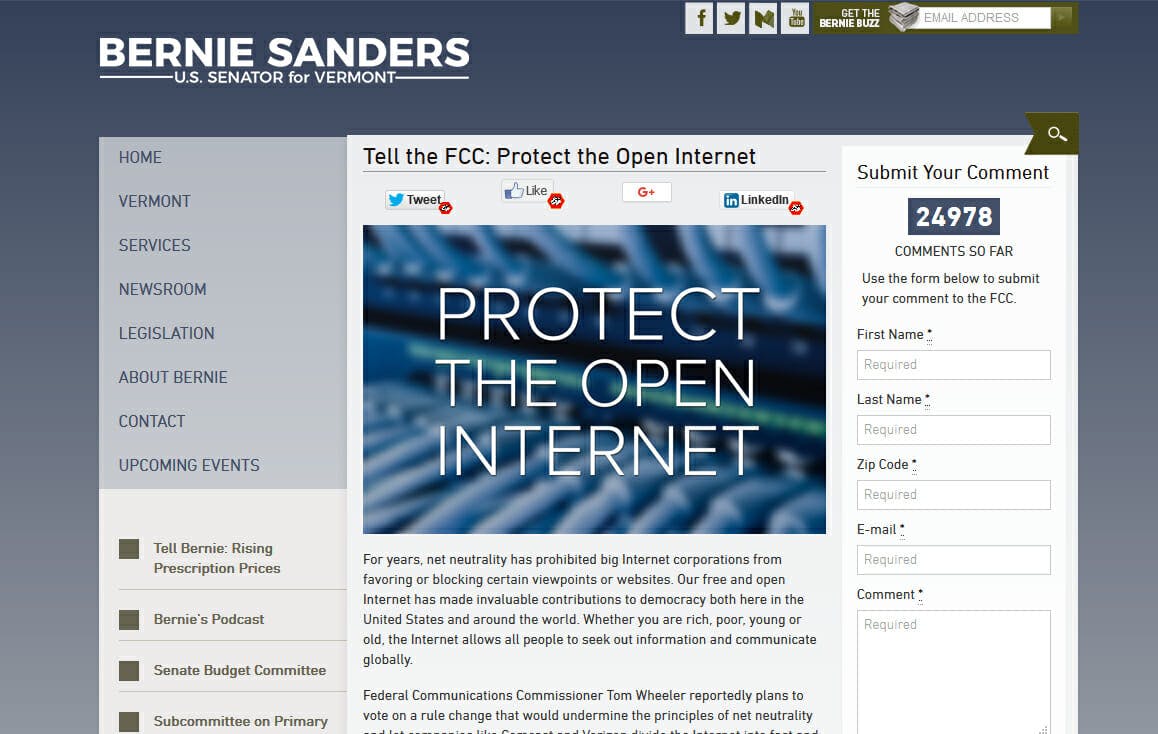
More recently Sanders has urged his followers to support the CRA effort in the House last year.
The Senate just took an important step toward reversing the Trump administration’s disastrous decision to repeal #NetNeutrality. Now the House must side with the 86% of Americans who support net neutrality and pass this resolution to protect our free speech and democracy.
— Bernie Sanders (@SenSanders) May 16, 2018
Sanders has been aggressive in calling for net neutrality protections for years and his past comments suggest that, if elected, it would be a priority for his administration.
2) Elizabeth Warren 2020 Net Neutrality
Like Sanders, Sen. Elizabeth Warren (D-Mass.) has long supported net neutrality. In Nov. 2014, Warren said potential movement by the FCC to pass the 2015 Open Internet Order was “welcome news for all of us who have stood up for a free & open internet.”
In 2017, Warren also addressed the Senate and pushed back against the FCC’s decision to repeal.
She was also among a handful of senators who asked the FCC to delay its vote to repeal the regulations after the agency handed over thousands of documents as part of a lawsuit against its repeal order.
More recently, Warren gave a speech on the Senate floor about net neutrality in May 2018, urging for more lawmakers to sign onto the Senate version of the CRA.
“Right now our access to a fair and open internet is under siege,” she said, adding: “If the FCC will not stand up for the public interest, it’s up to Congress to do so. But it will take this Republican-controlled Congress, prying itself free from the grip of giant companies, and doing what’s right for the American people. Today we can take that first step.”
On the campaign trail, the Washington Post reported that she told a crowd in Iowa that she believed “in net neutrality the same way I believe everybody should have access to electricity.”
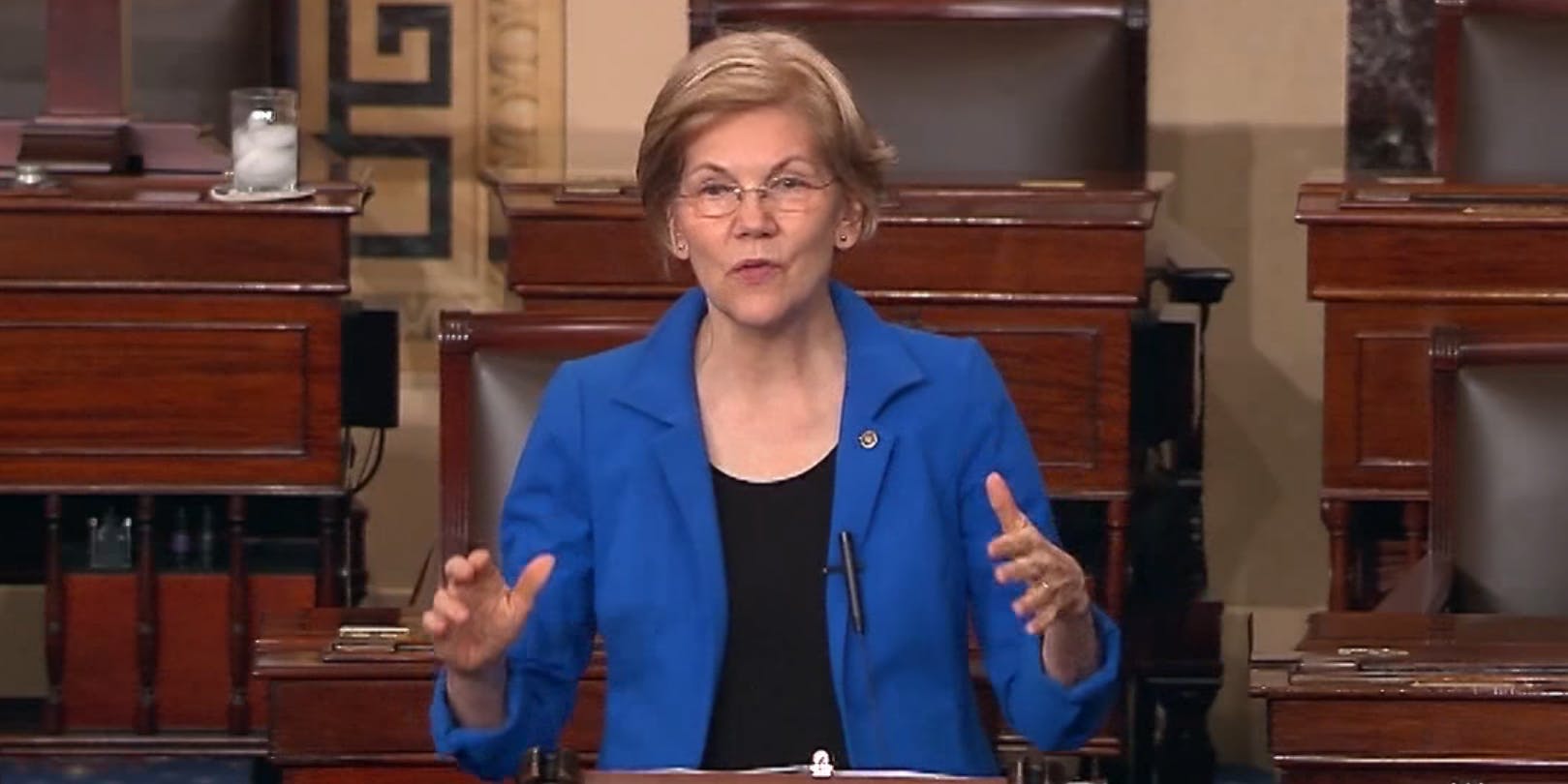
READ MORE:
- House Republicans offer bipartisan net neutrality bill—but there’s a catch
- This bill would stop internet companies from throttling service during disasters
- FCC net neutrality repeal criticized in House subcommittee hearing
3) Kamala Harris 2020 Net Neutrality
Despite a short tenure in Congress, Sen. Kamala Harris (D-Calif.) has argued in favor of net neutrality on several occasions.
In July 2017 she published her comment to the FCC regarding the upcoming repeal vote, adding that its proposal would “dismantle strong and enforceable net neutrality rules” and was a “grave threat to the Internet’s success, and to California’s future.”
Around the time of the Senate CRA, Harris also said net neutrality was “paramount to the success of our economy and free speech rights—no one website should be prioritized over another.”
Harris also questioned Supreme Court Justice Brett Kavnaugh about his views on net neutrality. While she did not publicly question him like fellow 2020 contender Sen. Amy Klobuchar (D-Minn.) did, the California senator did submit follow-up questions to the then-nominee during his confirmation hearings.
Within the questions, Harris asked Kavanaugh if he would recuse himself from a hypothetical case he may preside over surrounding net neutrality.
The questions came in response to a 2017 dissent Kavanuagh wrote when he was a judge in the U.S. Court of Appeals for the D.C. Circuit that upheld the 2015 Open Internet Order.
“Given that you have already staked out such a clear position on the unconstitutionality of net neutrality, will you commit to recusing yourself from a case if the Supreme Court were to consider a future First Amendment challenge to net neutrality?” she asked.
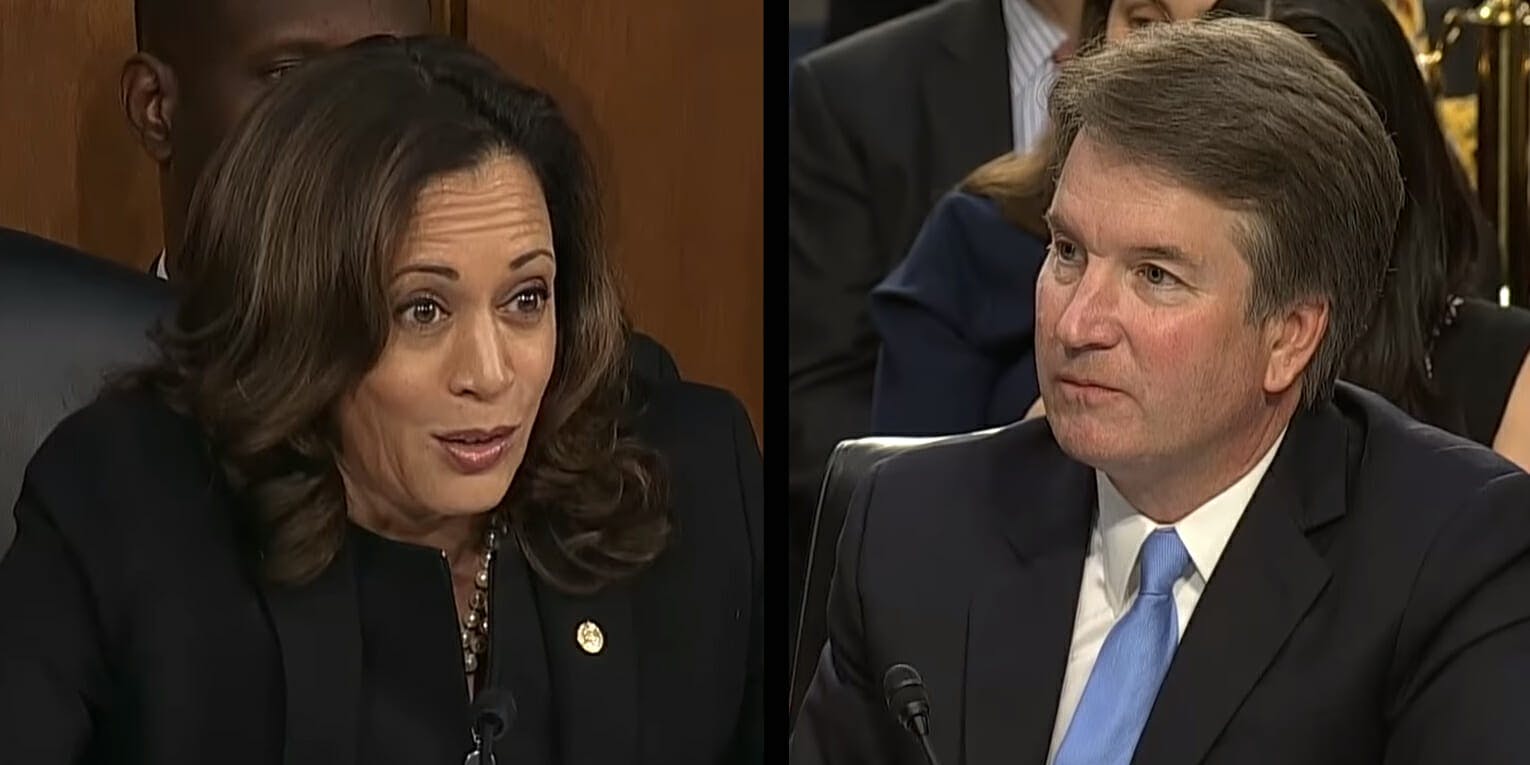
4) Kirsten Gillibrand 2020 Net Neutrality
Sen. Kirsten Gillibrand (D-N.Y.) has also been vocal in supporting net neutrality since at least 2014.
The New York senator urged the FCC to classify broadband internet as a “telecom utility” in July 2014, and announced that she would not vote to confirm Ajit Pai following the 2016 presidential election.
In a blog post for Refinery29 in late 2017, Gillibrand and FCC Commissioner Jessica Rosenworcel argued that rolling back net neutrality would “hit especially hard” for women.
“Consider that while one third of businesses in this country are owned by women, nearly 90 percent of sellers on the online marketplace Etsy are female,” they wrote. “Many of these women work from home and most of them use this kind of platform to sell their wares for the first time. That’s precisely the kind of opportunity the open Internet makes possible and it’s what has led Etsy to say that it ‘would not exist without net neutrality.’”
Gillibrand was also one of the first senators to sign onto the Senate CRA following the FCC’s repeal.
#NetNeutrality protections end today, but let’s be clear: Our fight is far from over. The Senate voted to save the free and open internet—now, it’s up to the House to do the right thing. We must all keep speaking out.
— Kirsten Gillibrand (@SenGillibrand) June 11, 2018
5) Cory Booker 2020 Net Neutrality
Sen. Cory Booker (D-N.J) has used Twitter in the past to try and drum up support for net neutrality, and in 2014 he tweeted that he “strongly” favored the protections.
The New Jersey senator and Sen. Brian Schatz (D-Hawaii) created a video called the “lowest tech presentation about tech ever on the internet” in July 2017 to explain net neutrality. The video included stick figures with smiles for people with net neutrality and frowns for those without it.
If you want to save #netneutrality, https://t.co/gagPSeWISY pic.twitter.com/hoVxzAWKDc
— Cory Booker (@CoryBooker) July 12, 2017
In July 2017, Booker and Sen. Jon Tester (D-Mont.) also had a basketball-themed video produced ahead of the CRA efforts in the Senate where he called on his followers to pressure lawmakers into supporting it.
https://twitter.com/CoryBooker/status/968532650729275393
The most recent time Booker tweeted about net neutrality was in the aftermath of the Senate voting to pass its version of the CRA in May 2018.
“This is not a Republican or Democratic issue, this is about access to a free and open internet,” Booker said in a video the day of the vote.
However, following the FCC’s vote, Booker said that he would push for a “permanent solution that would protect consumers.” Judging by his past statements, it would appear that “solution” could include Title II classification.
READ MORE:
- House Dems campaigned on net neutrality. But will they act on it?
- Judges probe net neutrality advocates, FCC in oral arguments
- Verizon tried to Super Bowl ad its way out of data-throttling scandal
6) Amy Klobuchar 2020 Net Neutrality
Klobuchar used the high-profile nature of her presidential campaign launch speech in early February to address net neutrality, calling for a “guarantee” of the protections amid other technology policy proposals.
“For too long the big tech companies have been telling you, don’t worry, we’ve got your back,” she said during her speech. “While your identities, in fact, are being stolen and your data is being mined. Our laws need to be as sophisticated as the people who are breaking them. We must revamp our nation’s cybersecurity and guarantee net neutrality for all. And we need to end the digital divide by pledging to connect every household to the internet by 2022, and that means you, rural America.”
During the confirmation hearings for Supreme Court Justice Brett Kavanaugh, the Minnesota senator was the only lawmaker to verbally ask him about the 2017 dissent he wrote as a judge in the U.S. Court of Appeals for the D.C. Circuit for a case that upheld the 2015 Open Internet Order.
In the dissent, Kavanaugh argued that the order “forcibly reduces the relative voices of some Internet service and content providers and enhances the relative voices of other Internet content providers.”
Klobuchar questioned him about that view, saying he went “beyond the bounds of what the parties had argued to reach a constitutional issue in that case.”
The Minnesota senator has held round tables on the issue and has voiced her support for it on social media since at least 2015. She also seemed to enjoy Burger King’s ad about net neutrality.

7) Julian Castro 2020 Net Neutrality
It does not appear that Julian Castro, a former official in President Barack Obama’s administration, has made as many public statements about net neutrality as other 2020 Democratic hopefuls have.
In fact, his official Twitter @JulianCastro, has not tweeted about net neutrality, a contrast to all of the other 2020 primary candidates.
However, the former HUD secretary did call the internet a “necessity” when commenting on an FCC’s vote to rollback the Lifeline program. He also has spoken passionately about bringing internet access to low-income Americans on his (now archived) @SecretaryCastro account.
8) John Delaney 2020 Net Neutrality
Former Rep. John Delaney, who was the first Democrat to announce his 2020 bid, backed the House version of the CRA, signing the discharge petition in June 2018.
The former Maryland lawmaker also was a co-sponsor of the “Save Net Neutrality Act,” a bill that was introduced in the House in late 2017 ahead of the FCC’s vote that aimed to block the agency from using the public notice for their plan to reverse the rules.
After the FCC’s repeal, Delaney said he was concerned the rollback would “hurt consumers, entrepreneurs and small businesses, and undermine our global leadership on innovation.”
As he told the Daily Dot, he supports ISPs being classified under Title II and would “make reinstatement of these rules a priority of my Administration.”
Proud to be an original cosponsor of a resolution to reject the @FCC’s repeal of net neutrality. The Trump Administration’s decision to roll back net neutrality rules is bad for consumers, bad small businesses, and bad for innovators. #SaveTheInternet pic.twitter.com/9NXUOY9rAu
— Archive: Rep. John Delaney (@RepJohnDelaney) February 27, 2018
9) Tulsi Gabbard 2020 Net Neutrality
Rep. Tulsi Gabbard (D-Hawaii), much like Sen. Amy Klobuchar, has discussed net neutrality early in her presidential campaign.
The Hawaii lawmaker commented on reports that the repeal of the 2015 Open Internet Order did not casuse a boost in network investment, an argument championed by Pai leading up to the vote.
“No one should be surprised by this. Repealing #NetNeutrality was just another handout to big corporations & telecom giants. Access to high-speed Internet should be available for all Americans– not just those with the $$ to purchase special access rights,” Gabbard wrote in late January.
https://twitter.com/TulsiGabbard/status/1088919700631887874
Ahead of the FCC’s repeal vote, Gabbard gave several speeches on the House floor in support of keeping the 2015 Open Internet Order.
Gabbard was also a co-sponsor of the Online Competition and Consumer Choice Act of 2015, a bill that was introduced in the House that would have barred ISPs from giving preferential treatment to certain internet traffic.
In late February, Gabbard also put out a statement about the issue, branded with her 2020 logo.
“Net neutrality protects us from corporate censorship of information. The FCC’s obligation is to the people. We want an equal, open internet,” she wrote on Twitter.
https://twitter.com/TulsiGabbard/status/1099700849666940928
10) Andrew Yang 2020 Net Neutrality
Andrew Yang, the former tech executive who has been advocating for universal basic income while on the campaign trail, has an entire page on his website dedicated to net neutrality.
Besides supporting the reinstatement of the regulations, Yang goes a step further on his policy page:
“On top of keeping ISPs classified under Title II, competition should be increased through local-loop unbundling,” it reads. “This would provide startups with access to the expensive, final wires connecting the internet ‘backbone’ to residences so that they can innovate and compete in an otherwise stifled market. By doing so, prices will come down away from their current monopoly levels and thus increase internet access further.”
If elected, Yang said he would appoint FCC commissioners who would “immediately” reclassify ISPs under Title II.
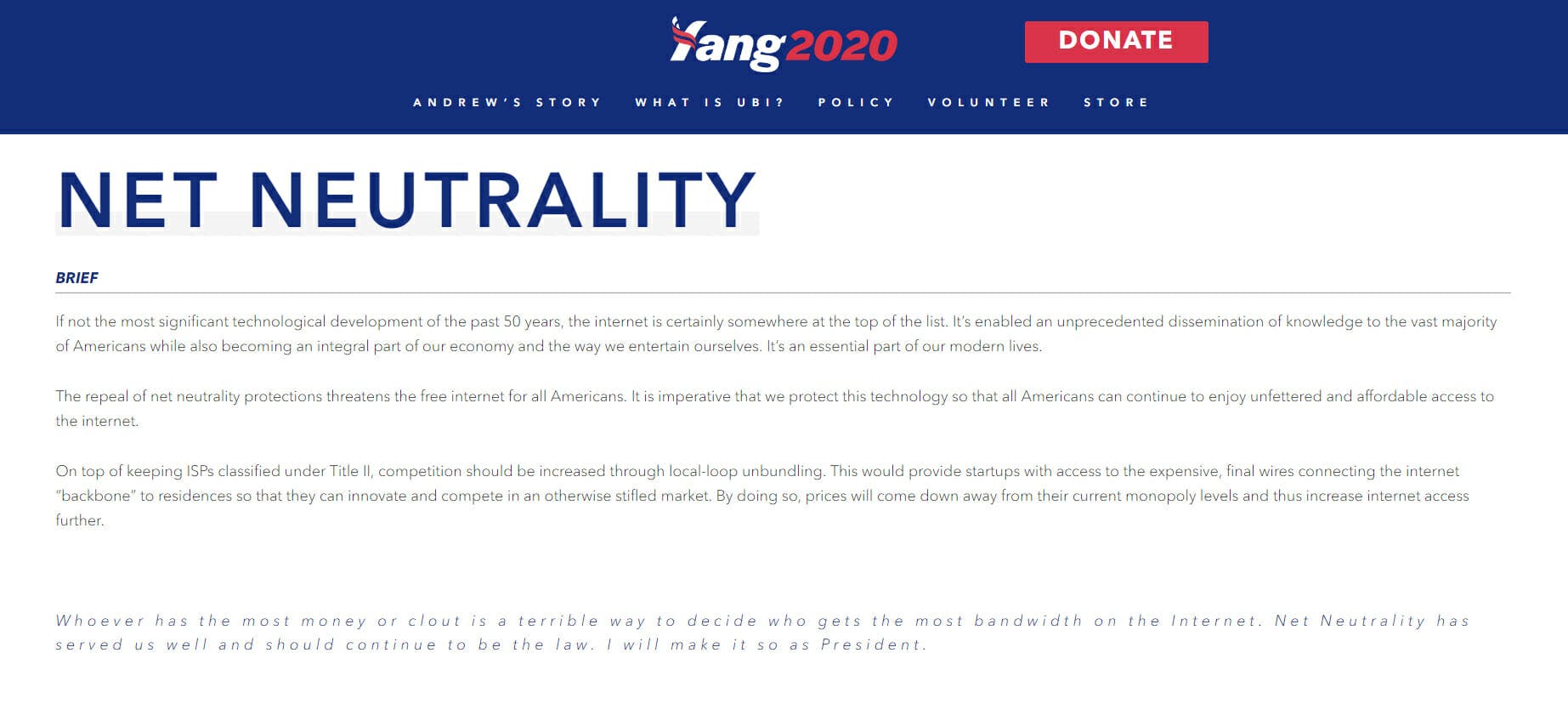
11) Pete Buttigieg 2020 Net Neutrality
Pete Buttigieg, the mayor of South Bend, Indiana, signed the Cities Open Internet Pledge following the FCC’s net neutrality repeal.
The pledge asked mayors to have internet providers that follow net neutrality principles.
“South Bend residents expect a free and open internet,” Buttigieg said, according to WNDU16, a television station in Indiana. “Access to government services online should be a given, not a privilege.”
The Indiana mayor was more pointed on Twitter amid the FCC’s repeal.
“The truth is this #NetNeutrality decision probably won’t affect your daily life. Unless you use the Internet,” he wrote.
The truth is this #NetNeutrality decision probably won’t affect your daily life. Unless you use the Internet.
— Pete Buttigieg (@PeteButtigieg) December 14, 2017
Other nominees
Other nominees like Washington Gov. Jay Inslee signed a net neutrality law for the state that was created in response to the FCC repeal. The law blocked internet service providers from blocking or slowing content, according to the Washington Post.
Similarly, former Colorado Gov. John Hickenlooper posted on Twitter around the time of the repeal that the agency “voted against innovation and against fair access to information and content.”
READ MORE:

